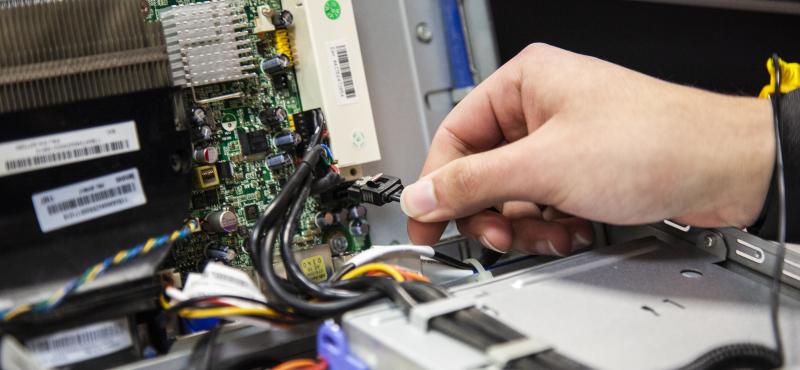Program Goals:
The Personal Computer Specialist Certificate prepares graduates to work in the information technology field as computer support specialists with an emphasis on personal computer/desktop management and support. According to the Occupational Outlook Handbook, 2016-2017 Edition, employment of computer support specialists is expected to increase by 12% from 2014 to 2024, which is faster than the average for all occupations.1 Demand for these workers will result from the increased use of IT and digital communications technology by individuals and organizations. As technology becomes more complex and prevalent, a greater level of support will become essential to users and their employers. A personal computer specialist has “responsibility for analyzing, managing, supervising, or performing work necessary to plan, design, develop, acquire, document, test, implement, integrate, maintain, or modify systems for solving problems or accomplishing work processes by using computers” in a desktop or personal computer environment.2
1www.bls.gov/ooh/
2https://archive.opm.gov/fedclass/gs0334.pdf
Student Learning Outcomes:
Upon completion of the program, graduates will be able to:
- Know fundamental business methods, including communications, math, and writing.
- Demonstrate the application of information technology to common business functions, including the implementation and use of basic end user software.
- Perform support and maintenance of computer hardware.
- Analyze and apply operating systems concepts to implement and support multiple industry standard operating systems in enterprise networking environments.
- Apply an understanding of basic programming structures and algorithms.
- Deploy and manage common third-party applications to support business needs.
- Troubleshoot computer resources to resolve user problems.
Admissions Process:
Admissions inquiries should be directed to admissions@qcc.mass.edu. Prospective students may apply to the program of their choice by following the enrollment steps at www.QCC.edu/enrollment-steps.
Program Admissions Requirements:
Students should note that some first semester courses carry minimum prerequisites. Refer to the program grid.
- High School Diploma or GED/HiSET.
CORI, SORI, Finger Printing & Drug Testing:
Criminal Offender Record Information (CORI) and Sex Offender Registry Information (SORI) checks are not required. Fingerprinting and drug testing are not required.
Additional Cost:
See the Program Fees page.
- Students who pursue any of the industry certifications will incur additional expenses for testing fees.
Technical Performance Standards:
See the Technical Performance Standards page. (Note: Not all programs have technical performance standards).
Credit for Prior Learning:
Credit for Prior Learning (CPL) allows students to use skills they already have towards a college degree or certificate. Work, life, volunteer and military experience may be translated into credit, allowing students to take fewer classes and earn their degree faster. CPL eliminates redundancies for students who have already earned credentials or mastered skills required for their program of study. Email experience@qcc.mass.edu for more information and eligibility.
Career Outlook:
Please consult the Massachusetts Career Information System at https://masscis.intocareers.org/ or the Occupational Outlook Handbook at www.bls.gov/ooh/ for specific occupational information. The CIP code for this program is 11.1006.
Transfer Articulations & Opportunities:
Prospective students may learn more about transfer articulation agreements at www.QCC.edu/agreements. More information regarding transfer opportunities is available at www.QCC.edu/transfer.
Additional Information:
- The Personal Computer Specialist Certificate offers extensive coursework, lecturing on theoretical information technology design, principles, and approaches and supplementing the lecture with practical hands-on application in QCC’s state-of-the-art CSET labs.
- The Personal Computer Specialist Certificate offers courses that teach material from several industry standard certifications including:
- Computing Technology Industry Association (CompTIA):
- A+ - CSC 233
- Linux+ - CST 245
- Microsoft’s 365 Certified Associate in the following topics:
- Windows Desktop - CSC 141


